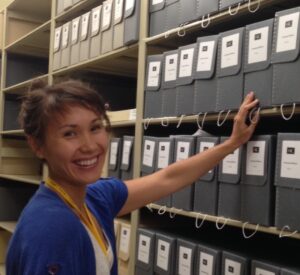Hello TARO! My name is Hannah Rainey and I am the schema compliance intern for the 21st Century Collaborative Planning Project. I am very honored and excited to join the effort to update TARO. I am passionate about improving access, both in the reading room and behind the scenes.
Before I describe my role in the project, let me tell you a little bit about myself. I grew up in lovely Boise, Idaho where I developed a love for the outdoors. I attended Wellesley College in Massachusetts where I developed a hatred of winter. In 2010, I completed a BA in Cinema and Media Studies. I began working at a music library as an undergrad and have since worked in a variety of libraries and archives, including a short and very fun stint at the Library of Congress Packard Campus for Audio Visual Conservation. Currently, I am a Graduate Intern in Reference and Public Services at the Harry Ransom Center. If all goes as planned, I will graduate with a master’s degree from the UT School of Information this December.
From now until January, I will work directly with archivists at the Briscoe Center and librarians at UT Libraries to develop workflows for testing EAD finding aids. My goal is to identify common pain points in the transformation from DTD to Schema, and get a general sense of the time it will take to correct common errors, both manually and programmatically. My work will comprise a small portion of the overall effort to update and adopt shared encoding standards across the TARO consortium.
If you have any questions or comments please email me: rainey.hannahleah@gmail.com


